- Home
- Tony Hillerman
The Fallen Man jlajc-12 Page 15
The Fallen Man jlajc-12 Read online
Page 15
Chee sat down again and picked up the oldest ledger. On his last visit he’d checked the entries on the days following Breedlove’s disappearance but only with a casual glance. This time he’d be thorough.
Lucy Sam came in, washed her hands, and looked at him while she dried them.
“Something wrong?”
“Disappointed,” Chee said. “So many details. This will take forever.”
“He didn’t have anything else to do,” Lucy Sam said, voice apologetic. “After he got that sickness with his nerves, all he could do after that was get himself into his wheelchair. He couldn’t go anyplace, he’d just sit there in the chair and sometimes he would read, or listen to the radio. And then he would watch through his telescope and keep his notes.” And he kept them very well, Chee noticed. Unfortunately they didn’t seem to include what he wanted to find.
The date Hal Breedlove vanished came about midpoint in the old ledger. In Hosteen Sam’s eyes it had been a windy day, cool, crows beginning to gather as they did when summer ended, flying in great, disorganized twilight flocks past Ship Rock to their roosting places in the San Juan River woods. Three oil field service trucks came down the road toward Red Rock and turned toward the Rattlesnake field. Some high clouds appeared but there had been no promise of rain.
The next day’s entry was longer, devoted largely to the antics of four yearling coyotes who seemed to be trying to learn how to hunt in the prairie dog town down the slope. Interesting, but not what Chee was hoping for.
An hour and dozens of pages later, he closed the ledger, rubbed his eyes, and sighed.
“You want some lunch?” Lucy Sam asked, which was just the question Chee had been hoping to hear. Lucy had been there at the stove across the kitchen from him, cutting up onions, stirring, answering his questions about abbreviations he couldn’t read or points he didn’t understand, and the smell of mutton stew had gradually permeated the room and his senses—making this foolish search seem far less important than his hunger.
“Please,” he said. “That smells just like the stew my mother used to make.”
“Probably is the same,” Lucy said. “Everybody has to use the same stuff—mutton, onions, potatoes, can of tomatoes, salt, pepper.” She shrugged.
Like his mother’s stew, it was delicious. He told Lucy what he was looking for—about the disappearance of Hal Breedlove and then his skeleton turning up on the mountain. He was looking for some idea of when Hal Breedlove returned to make his fatal climb.
“You find anything?”
“I think I learned that the man didn’t come right back here after running away from his wife in Canyon de Chelly. At least there was no mention of anybody climbing.”
“There would have been,” she said. “How far did you get?”
“Just through the first eight weeks after he disappeared. It’s going to take forever.”
“You know, they always do it the same way. They start climbing just at dawn, maybe before. That’s because they want to get down before dark, and because there’s some places where that black rock gets terribly hot when the afternoon sun shines on it. So all you got to do is take a look at the first thing written down each day. He would always do the same every morning. He would get up at dawn and roll his wheelchair to the door. Then he would sing the song to Dawn Boy and bless the morning with his pollen. Next he would take a look at his mountain. If there was anything parked there where the climbers always left their cars, it would be the first thing he wrote down.”
“I’ll try that, then,” he said.
On the page at which Chee reopened the ledger the first entry was marked 9/15/85, which was several pages and eight days too early. He glanced at the first line. Something about a kestrel catching a meadowlark. He paged forward, checking Lucy’s advice by 56 of 102
15/03/2008 19:57
TheFallenMan
file:///C:/Documents%20and%20Settings/Floop/Local%20Settings/Te...
scanning down the first notes after dates.
Now he was at 9/18/85—halfway down the page. The first line read, “Climbers. Funny looking green van where climbers park.
Three people going up. If Lucy gets back from Albuquerque I will get her to go into Shiprock and tell the police.” Chee checked the date again. September 18, 1985. That would be five days before Hal Breedlove disappeared from the Canyon de Chelly. He scanned quickly down the page, looking for other mentions of the climbers. He found two more on the same day.
The first said: “They are more than half way up now, creeping along under a cliff—like bugs on a wall.” And the second: “The headlights turned on on the fancy green car, and the inside lights. I see them putting away their gear. Gone now, and the police did not come. I told Maryboy he should not let anyone climb Tse´ Bitáí´ but he did not listen to me.” Lucy was washing dishes in a pan of water on the table by the stove, watching him while she worked. He took the ledger to her, pointed to the entry.
“Do you remember this?” Chee asked. “It would have been about eleven years ago. Three people came to climb Ship Rock in some sort of green van. Your father wanted you to go tell the police but you had gone to Albuquerque.” Lucy Sam put on her glasses and read.
“Now why did I take the bus to Albuquerque?” she asked herself. “Yes,” she answered. “Irma was having her baby there. Little Alice. Now she’s eleven. And when I came home he was excited about those climbers. And angry. He wanted me to take him to see Hosteen Maryboy about it. And I took him over there, and they argued about it. I remember that.”
“Did he say anything about the climbers?”
“He said they were a little bit slow. It was after dark when they got back to the car.”
“Anything about the car?”
“The car?” She looked thoughtful. “I remember he hadn’t seen one like it before. He said it was ugly, clumsy looking, square like a box. It was green and it had a ski rack on top.”
Chee closed the ledger and handed it to Lucy, trying to remember how Joe Leaphorn had described the car Hal Breedlove had abandoned after he had abandoned his wife. It was a recreational vehicle, green, something foreign-made. Yes. A Land-Rover. That would fit old man Sam’s description of square and ugly.
“Thank you,” he said to Lucy Sam. “I have to go now and see what Hosteen Maryboy can remember.” 19
THE SUNSET HAD FLARED OUT
behind Beautiful Mountain when Chee’s patrol car bounced over Lucy Sam’s cattle guard and gained the pavement. In the darkening twilight his headlights did little good and Chee almost missed the unmarked turnoff. That put him on the dirt track that led southward toward Rol Hai Rock, Table Mesa, and the infinity of empty country between these massive old buttes and the Chuska range.
Lucy Sam had told him: “Watch your odometer and in about eight miles from the turnoff place you come to the top of a ridge and you can see Maryboy’s place off to the left maybe a mile.”
“It’ll be dark,” Chee said. “Is the turnoff marked?”
“There’s a little wash there, and a big cottonwood where you turn,” she said. “It’s the only tree out there, and Maryboy keeps a ghost light burning at his hogan. You can’t miss it.”
“Okay,” Chee said, wishing she hadn’t added that ‘can’t miss it’ phrase. Those were the landmarks he always missed.
“There’s a couple of places with deep sand where you cross arroyos. If you’re going too slow, you might get stuck. But it’s a pretty good road in dry weather.”
Chee had been over this track a time or two when duty called, and did not consider it pretty good. It was bad. Too bad to warrant even one of those dim lines that were drawn on the official road map with an “unimproved” label and a footnoted warning. But Chee drove it a little faster than common sense dictated. He was excited. That boxy green vehicle must have been Hal Breedlove’s boxy green Land-Rover—the same car he’d seen at the Lazy B. One of those three men who climbed out of it must have been Breedlove.
Why not suspec
t that one of the other two was the man who had called Breedlove at the Thunderbird Lodge three or four days later and lured him away from his wife to oblivion? He would get a description from Maryboy if the old man could provide one. And he might be able to because those who live lonely lives where fellow humans are scarce tend to remember strangers—especially those on the strange mission of risking their lives on Ship Rock. Whatever, he would learn all he could and then he would call Leaphorn.
For a reason he didn’t even try to understand, sitting across a table from the Legendary Lieutenant and telling him all this seemed extremely important to Chee. He had thought he was angry at Leaphorn for signing up with John McDermott. But Leaphorn’s clear 57 of 102
15/03/2008 19:57
TheFallenMan
file:///C:/Documents%20and%20Settings/Floop/Local%20Settings/Te...
black eyes would study him with approval. Leaphorn’s dour expression would soften into a smile. Leaphorn would think awhile and then Leaphorn would tell him how this bit of information had solved a terrible puzzle.
The odometer had clicked off almost exactly the eight prescribed miles from the turnoff and the track was topping the ridge. The moon was not yet up, but the ragged black shape of the Chuskas to the right and the flat-topped bulk of Table Mesa to the left were outlined against a sky a-dazzle with stars. Ahead an ocean of darkness stretched toward the horizon. Then the track curved past a hummock of Mormon tea, and there shone the Maryboy ghost light, punctuating the night with a bright yellow spot.
Chee made the left turn past the cottonwood Lucy Sam had described into two sandy ruts separated by a grassy ridge. They led him along a shallow wash toward the light. The track dipped down a slope and the bright spot became just a glow. He heard a thud from somewhere a long ways off. More like a sudden clapping sound. But he was too busy driving for the moment to wonder what caused it. The track had veered down the bank of the wash, tilting his police car. It entered a dense tangle of chaparral, converted by his headlights into a tunnel of brightness. He emerged from that.
The ghost light was gone.
Chee frowned, puzzled. He decided it must be just out of sight behind the screen of brush he was driving past. The track emerged from the brush into flat grassland where nothing grew higher than the sage. Still no ghost light. Why not? Maryboy had turned it off, what else? Or the bulb had burned out. Out here, Maryboy wouldn’t be on a Rural Electrification Administration power line. He’d be running a windmill generator and battery system. Perhaps the batteries had gone dead. Nonsense. And yet the only reason one puts out a ghost light is because, for some reason, he believes he is threatened by the spirits of the dead. And if he believes that, why would he turn it off before Dawn Boy has restored harmony to the world? And why would he turn it off when he’d seen he had a visitor coming? Had Maryboy been expecting someone he would want to hide from?
Chee covered the last quarter mile slower than he would have had the light still been burning. His patrol car rolled past a plank stock pen with a loading ramp for cattle. His headlights reflected from the aluminum siding of a mobile home. Beyond it he could see the remains of a truck with its back wheels removed. Beyond that a fairly new pickup stood, and behind that, a small hogan, a small goat pen, a brush arbor, and two sheds. He parked a little further from the house than he would have normally and left the motor running a bit longer. And when he turned off the ignition he rolled down the window beside him and sat listening.
There was no light in the mobile home. Cold, dry December air poured through the truck window. It brought with it the smell of sage and dust, of dead leaves, of the goat pen. It brought the dead silence of a windless winter night. A dog emerged from one of the sheds, looking old, ragged, and tired. It limped toward his truck and stopped, the glare of his headlights reflecting from its eyes.
Chee leaned out of the window toward it. “Anybody home?” he asked. The dog turned and limped back into the shed. Chee switched off the car lights and waited, uneasy, for some sign of life from the house. Tapped his fingers on the steering wheel.
Listened. From somewhere far away he heard the call of a burrowing owl hunting its prey. He thought. Someone turned off that damned ghost light. Therefore someone is here. I am absolutely not going back home and admit I came out here to talk to Maryboy and was too afraid of the dark to get out of the car.
Chee muttered an expletive, made sure that his official .38-caliber pistol was securely in its holster, took the flashlight from its rack, opened the car door, and got out—thankful for the policy that eliminated those dome lights that went on when the door opened. He stood beside the car, glad of the darkness, and shouted, “Hosteen Maryboy,” and a greeting in Navajo. He identified himself by clan and family. He waited.
Only silence. But the sound of his own voice, loud and clear, had burst the bubble of his nervousness. He waited as long as politeness required, walked up to the entrance, climbed the two concrete block steps that led to the door, and tapped on the screen.
Nothing. He tapped again, harder this time. Again, no response. He tried the screen, swung it open. Tried the door. The knob turned easily in his hand.
“Hosteen Maryboy,” Chee shouted. “You’ve got company.” He listened. Nothing. And opened the door to total darkness. Flicked on his flash.
If time is measurable in such circumstances, it might have taken a few nanoseconds for Chee’s flashlight beam to traverse this tiny room from end to end and find it unoccupied. But even while this was happening, his peripheral vision was telling him otherwise.
He turned the flashlight downward.
The body lay on its back, feet toward the door, as if the man had come to answer a visitor’s summons and then had been knocked directly backward.
In the moment that elapsed before Chee snapped off the flash and jumped into the darkness of the house he had reached several conclusions. The man had been shot near the center of the chest. He was probably, but not certainly, Mr. Maryboy. The claplike sound he had heard had been the fatal shot. Thus the shooter must be nearby. Having shot Maryboy, and seen Chee’s headlights, he had switched off the ghost light. And, more to the immediate point, Acting Lieutenant Jim Chee was likely to get shot himself. He leaned against the wall beside the door, drew the pistol, cocked it, and made sure the safety was off.
Chee spent the next few minutes listening to the silence and thinking his situation through. Among the aromas that came from Hosteen Maryboy’s kitchen he had picked up the acrid smell of burned gunpowder, confirming his guess that Maryboy had been shot only a few minutes ago. A frightening conclusion, it reinforced the evidence offered by the doused ghost light. The killer had 58 of 102
15/03/2008 19:57
TheFallenMan
file:///C:/Documents%20and%20Settings/Floop/Local%20Settings/Te...
not driven away. Chee would have met him on the access track. That he had walked away was possible but not likely. It would have meant abandoning his vehicle. Was it the pickup he’d noticed? Perhaps. But that was most likely Maryboy’s. The killer, having seen him coming, would have had plenty of time to move his car but no way to drive out without meeting Chee on the track.
So what options did he have?
Chee squatted beside the body, felt for a pulse, and found none. The man was dead. That reduced the urgency a little. He could wait for daylight, which would even the odds. As it now stood the killer knew exactly where he was and he didn’t have a clue. But waiting had a downside, too. It would occur to the killer sooner or later to fire a shot into the patrol car gas tank—or do something else to disable it. Then he could drive away unpursued. Or he might drain out some gasoline from any one of the vehicles, set this mobile home ablaze, and shoot Chee as he came out.
By now his eyes had adjusted to the darkness. Chee could easily see the windows. The starlight that came through them—dim as it was—allowed him to make out a chair, a couch, a table, and the door that led into the kitchen.
Could the killer be the
re? Or in the bedroom beyond it? Not likely. He sat against the wall, holding his breath, focusing every instinct on listening. He heard nothing. Still, he dreaded the thought of being shot in the back.
Chee picked up the flash, held it far from his body, pointed both his pistol and the flash at the kitchen doorway, and flicked it on.
Nothing moved in the part of the room visible to him. He edged to the door, keeping the flash away from him. The kitchen was empty. And so, when he repeated that process, were the bedroom and the tiny bath behind it.
Back in the living room, Chee sat on the couch and made himself as comfortable as the circumstances permitted. He weighed the options, found no new ones, imagined dawn coming, imagined the sun rising, imagined waiting and waiting, imagined finally saying to hell with it and walking out to the patrol car. Then he would either be shot, or he wouldn’t be. If he wasn’t shot, he would have to get on the radio and report this affair to Captain Largo.
“When did this happen?” the captain would ask, and then, “Why did you wait all night to report it?” and then, “Are you telling me that you sat in the house all night because you were afraid to come out?” And the only answer to that would be, “Yes, sir, that’s what I did.” And then, a little later, Janet Pete would be asking why he was being dismissed from the Navajo Tribal Police, and he would say— But would Janet care enough to ask? And did it matter anyway?
Something mattered. Chee got up, stood beside the door, looking and listening—impressed with how bright the night now seemed outside the lightless living room. But he saw nothing, and heard nothing. He pushed open the screen and, pistol in hand, dashed to the patrol car, pulled open the door and slid in—crouched low in the seat, grabbed the mike, started the engine.

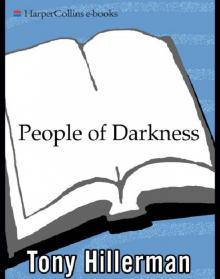 People of Darkness
People of Darkness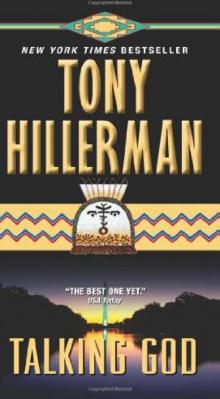 Talking God jlajc-9
Talking God jlajc-9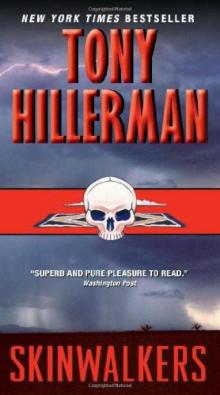 Skinwalkers jlajc-7
Skinwalkers jlajc-7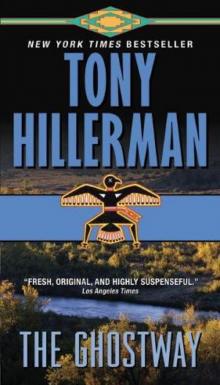 The Ghostway jlajc-6
The Ghostway jlajc-6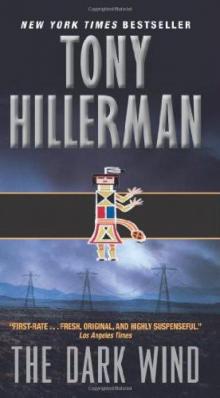 The Dark Wind jlajc-5
The Dark Wind jlajc-5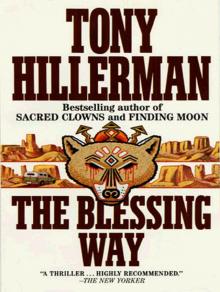 The Blessing Way
The Blessing Way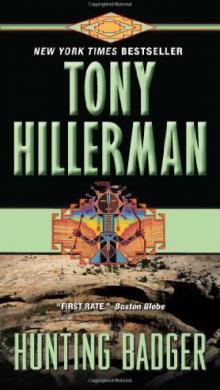 Hunting Badger jlajc-14
Hunting Badger jlajc-14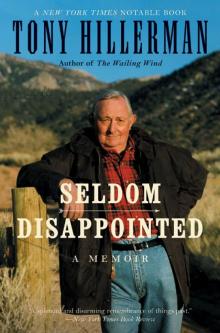 Seldom Disappointed: A Memoir
Seldom Disappointed: A Memoir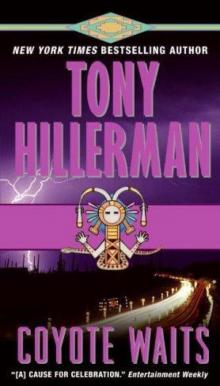 Coyote Waits jlajc-10
Coyote Waits jlajc-10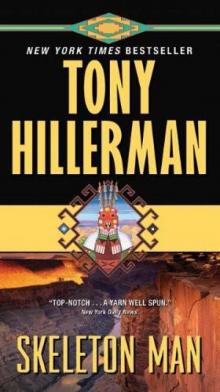 Skeleton Man jlajc-17
Skeleton Man jlajc-17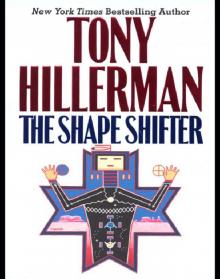 The Shape Shifter
The Shape Shifter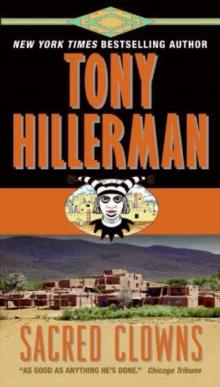 Sacred Clowns jlajc-11
Sacred Clowns jlajc-11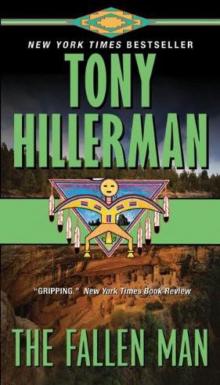 The Fallen Man jlajc-12
The Fallen Man jlajc-12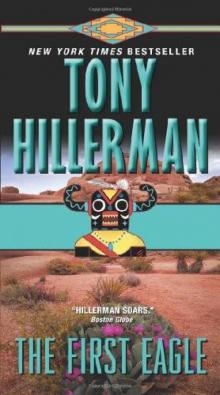 The First Eagle jlajc-13
The First Eagle jlajc-13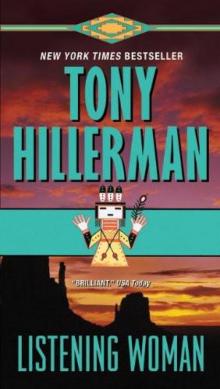 Listening Woman jlajc-3
Listening Woman jlajc-3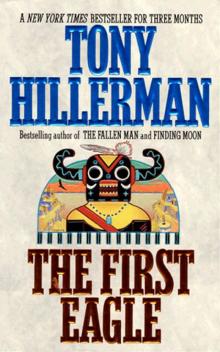 The First Eagle
The First Eagle Skeleton Man
Skeleton Man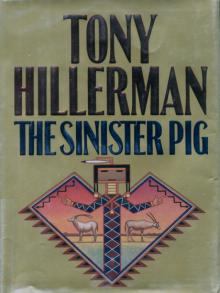 The Sinister Pig jlajc-16
The Sinister Pig jlajc-16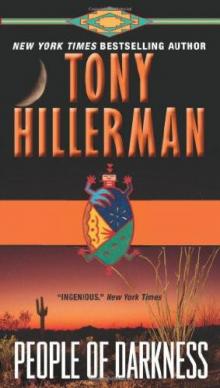 People of Darkness jlajc-4
People of Darkness jlajc-4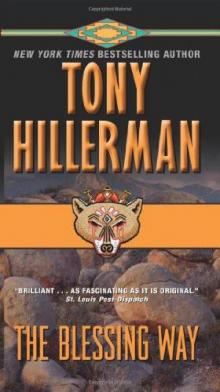 The Blessing Way jlajc-1
The Blessing Way jlajc-1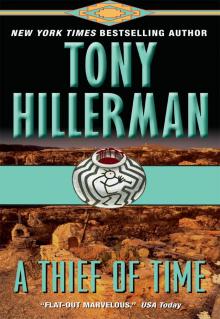 A Thief of Time
A Thief of Time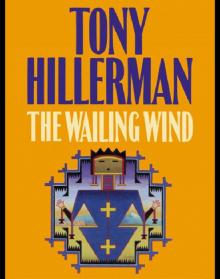 The Wailing Wind
The Wailing Wind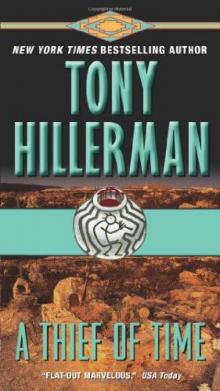 A Thief of Time jlajc-8
A Thief of Time jlajc-8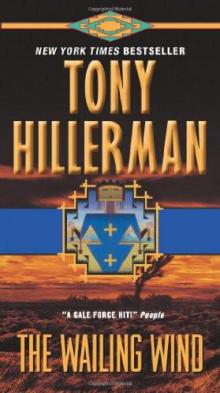 The Wailing Wind jlajc-15
The Wailing Wind jlajc-15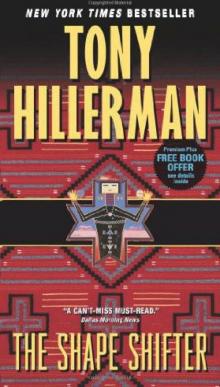 The Shape Shifter jlajc-18
The Shape Shifter jlajc-18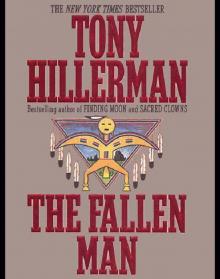 The Fallen Man
The Fallen Man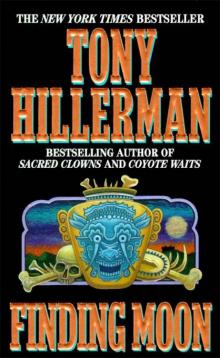 Finding Moon
Finding Moon